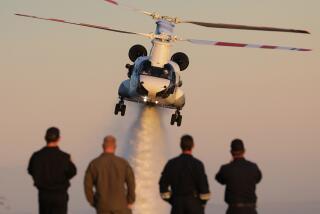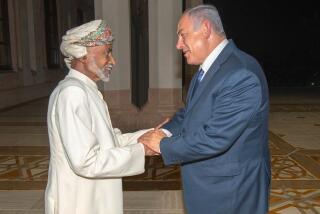Iraq Avoids ‘No-Fly’ Zone Despite Cabinet’s Rhetoric
- Share via
WASHINGTON — Iraq continued to obey an allied edict to keep its aircraft out of the southern part of the country Saturday despite an upsurge of air activity just north of the “no-fly” zone and bellicose rhetoric from Saddam Hussein’s Cabinet, the Pentagon reported.
“There have been no (Iraqi) flights south of the line of 32 degrees north latitude,” Pentagon spokesman Bob Hall said. “Basically everything’s quiet.”
Hall added that Iraqi antiaircraft batteries have not switched on their radar since the “no-fly” zone was imposed. However, news agency reports from U.S. warships in the Persian Gulf quoted pilots as saying that Iraq has resumed air activity north of the zone.
And in Baghdad, the Cabinet vowed to resist the allied order.
President Bush, backed by the governments of Britain and France, imposed the exclusion zone Wednesday to relieve the Iraqi military pressure on the mainly Shiite Muslim population of southern Iraq. The order bans all aircraft, including civilian airliners, from a zone south of the 32nd Parallel. U.S. officials said the Administration is considering additional action, such as bombing raids, if the current operation fails to stop the Iraqi army from cracking down on rebellious Shiites in the area near the border with Kuwait and Saudi Arabia. But the officials stressed that no decisions have been made.
Cmdr. Bob Playfair, 35, a fighter-bomber pilot from Chewelah, Wash., told reporters aboard the aircraft carrier Independence that he and other Navy fliers made radar contact with Iraqi planes flying near--but outside--the zone for the first time since the President issued his ultimatum, the Associated Press reported.
“They could be playing,” Playfair said when he returned from six hours patrolling Iraq’s southern marshland. “They could be training. We can’t tell.”
Aboard the LaSalle, flagship of the Navy’s Gulf task force, Air Force Lt. Col. Dennis Krembel also reported increased Iraqi activity.
“I talked to a couple of pilots that returned today, and they did have radar contacts. . . . It could be a rotary (helicopter), it could be fixed-wing, I don’t know if it was military or civilian,” Krembel, 41, of Poquoson, Va., told reporters, according to Reuters news agency.
He said the unidentified aircraft did not respond when U.S. warplanes told them to identify themselves. He said the U.S. pilots took no further action.
In Baghdad, the Iraqi News Agency reported a Cabinet communique that vowed “to resist this plan with all its aspects and dealing with it with the disdain it deserves and meanwhile to continue the political and mobilizing activity inside and outside Iraq.”
However, Reuters quoted an unnamed senior Iraqi official as saying that Baghdad plans to sit tight and wait for the United States, Britain and France to tire of flying air patrols.
And Health Minister Omid Medhat Mubarak told the Associated Press: “They want to provoke us, but we will be really patient.”
More to Read
Sign up for Essential California
The most important California stories and recommendations in your inbox every morning.
You may occasionally receive promotional content from the Los Angeles Times.













